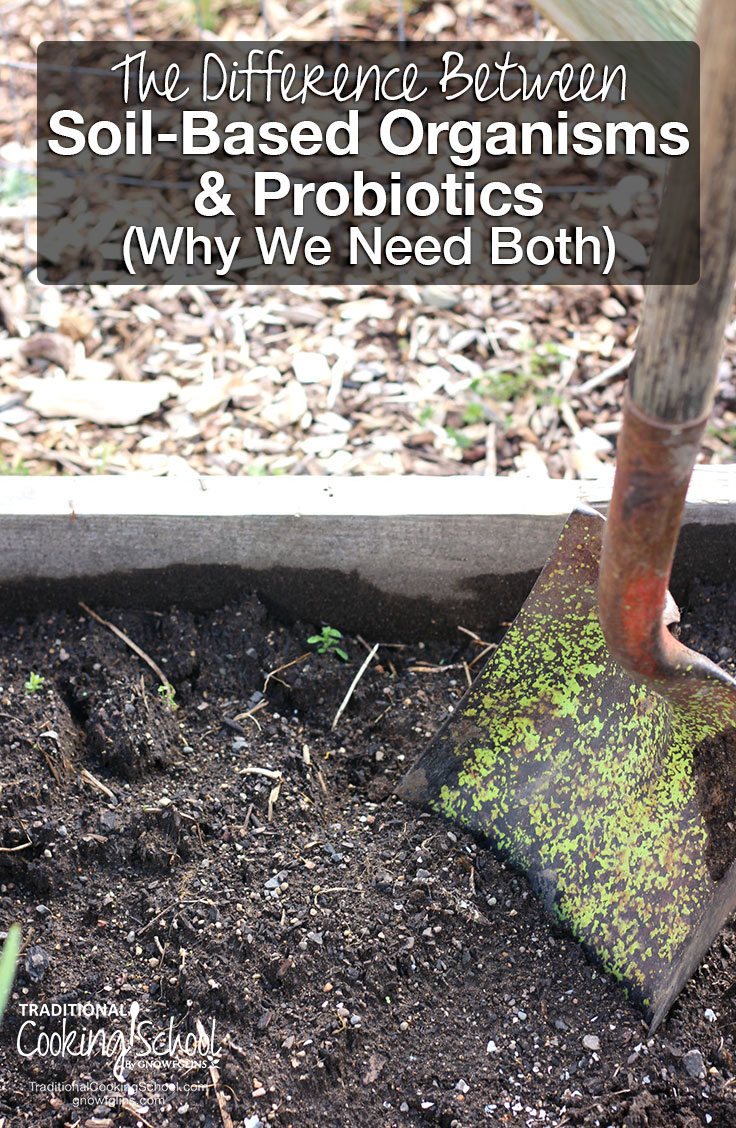
What are soil-based organisms? How do they differ from probiotics?
SBOs, or soil-based organisms, are a sub-category of probiotics. These bacteria come to life amidst warm, moist surroundings. Since they aren’t harmed by stomach acids, they travel to the small intestine. There, they germinate, or “seed”, and begin their symbiotic relationship with humans.
In other words, SBOs stick around. They stay in the intestines, germinating and reproducing (source).
According to researchers, humans carry about 100 trillion bacteria in and on our bodies. Some of these arrive via food, water, and our environment. Others are inherited from our families.
In 2010, the Human Microbiome Project delved into the world of germs, discovering 10,000 different bacteria in the human body. Each of these plays a different role in our health and wellness.
Let’s explore the difference between soil-based organisms and probiotics — and why we need BOTH!
How Do We Find Soil-Based Organisms?
Soil-based organisms, as suggested by their name, come from the earth. They don’t exist naturally in our bodies. They’re basically dirt spores!
Does this mean we aren’t meant to digest them? Not at all.
Once, when we ate food we also ate small amounts of dirt — rich in nutrients like Vitamin B12, zinc, selenium, and calcium. Now, the term “dirty” is synonymous with “dangerous” or “needing to be washed”.
Former cultures, however, ate from the earth and its soil, abundant in these microorganisms. They benefited as a result.
Unfortunately, modern farming practices such as pesticides, herbicides, fertilizers, and genetic engineering have diminished or destroyed these soil nutrients.
By intentionally ingesting a soil-based probiotic supplement, we mitigate the effect of no longer having access to as many nutrients through our food. We help build our immunity to many pathogens, much as a child playing in the dirt does.
SBOs also help prevent or improve autoimmune conditions by correctly identifying invaders and triggering antibodies (source).
Additional Benefits Of Soil-Based Organisms
Did you know that SBOs benefit the body for up to a month after ingestion? In addition to this remarkably ability, they also work as an alternative to antibiotics, prevent gastrointestinal disorders, and ward off infections. (Source.)
Soil Probiotics Vs. Traditional Probiotics
According to a 2011 test, traditional probiotics had no effect on the long-term microbiome or general health of laboratory mice. Conversely, soil probiotics improved both the ongoing metabolic pathways and general health of mice. (Source.)
While many strains of probiotics cannot treat IBS symptoms, soil bacteria do reduce symptoms (source).
Finally, sensitive individuals often tolerate SBOs better than traditional probiotics. This is especially true for conditions such as histamine intolerance or SIBO (small intestinal bacterial overgrowth).
I recommend this soil probiotic!
Are Traditional Probiotics Still Beneficial?
Absolutely! Lactic acid bacteria such as Lactobacillus acidophilus are native to the human body. Our bodies benefit from floral diversity, and we should work to promote a variety of good bacteria, especially as we women pass on our microbiome to our children. Babies acquire bacteria from their mothers.
Bacterial diversity often decreases as we age, due to fluoridated water, the use of antibiotics, stress, and many other factors. Fermented foods or supplements help to offset this difference by aiding digestion, bolstering our immune system, healing inflammation, and more.
If consuming traditional probiotics, it is best to eat them with a meal. Digesting food shields them from the acidity of the stomach and gives them the best chance of survival. In particular, I recommend a multi-strain probiotic supplement, similar to what homemade ferments provide!
As time goes on, our understanding of probiotics is improving. We know that our microbiome directly affects our health. We know that probiotics work better if eaten with prebiotics — the foods that stimulate the growth of probiotics — and soil-based organisms.
A healthy baby relies on diverse gut flora. We too must reach for a multi-pronged solution to repopulate the adult human gut after stressors.
Did you know the difference between soil-based organisms and probiotics? Do you try to get both?
We only recommend products and services we wholeheartedly endorse. This post may contain special links through which we earn a small commission if you make a purchase (though your price is the same).


Thank you for this great information. Please share the brand names of some soil-based probiotics that I can buy, and also the scientific names of the strains that are best.
Hi Bemusedbaker! Megan recommends the Prescript-Assist soil probiotic. I’ve updated the post to include a link now. 🙂
–Haniya, TCS Team Editor
Hello Megan l use Garden of Life Primal Defense . I have tried many products over the years this is the best product i have ever used.
Ralph
Great article. Thanks so much. I feel that I am losing my health in many ways and am ready to heal my gut with traditional foods.
Are you familiar with Garden of Life? I am currently taking a probiotic from them that contains 35 strains. They also have a SBO formula which I will order next time. I got mine from Vitacost.com.
I’ve also ordered your book on fermenting and can’t wait to get the healing started! Thanks for being there and for following God’s call to educated His people. We are such an unhealthy bunch, just like the world, with our modern diets of junk food. Thanks for your help in redirecting us.